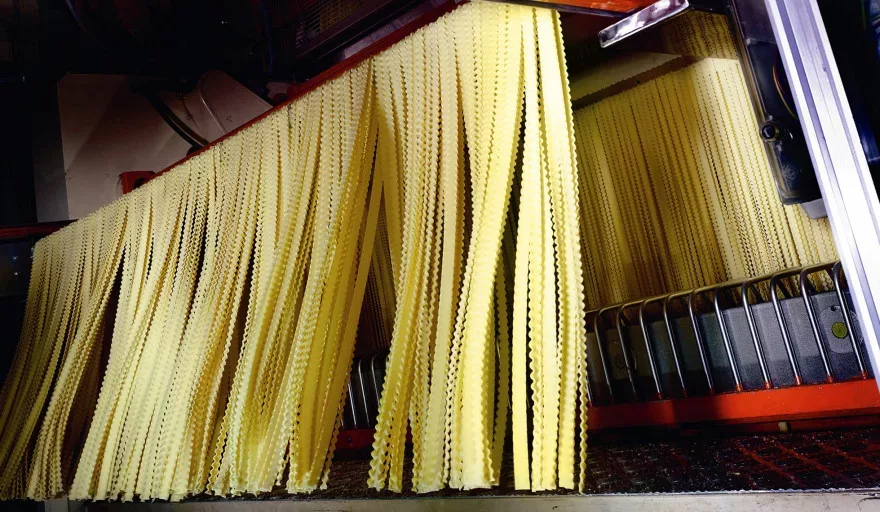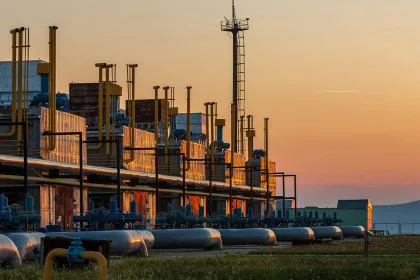Renowned as one of Italy’s finest producers of pasta, we speak with Carlo Aquilano, Commercial Director at De Cecco, to delve deeper into the organisation and its passion for pasta that has stood the test of time.
- PASTA WITHOUT COMPROMISE
- Q&A WITH CARLO AQUILANO, COMMERCIAL DIRECTOR, DE CECCO
- What is your take on the industry in Europe at the moment? Is it an exciting space to be working in?
- We understand you have just launched a gluten free pasta range. What has this meant?
- Are there any key investments or other things you’re working on that you’d like to pay special mention to?
- What about the company’s supply chain operations?
- Talk to us about your unique drying process? What are the key benefits of this?
- With sustainability in mind, how important is 100 percent recyclable material on all products?
- Looking ahead, what are your key priorities for the coming year?
PASTA WITHOUT COMPROMISE
De Cecco is one of the world’s largest pasta producers.
From the mill with a pasta shop to the modern industry, the De Cecco method has remained intact for more than a century, under the attentive eye of the De Cecco family. Indeed, De Cecco is now present on the tables of over 11 million Italian families, and employs more than 1,000 people, while offering over 400 pasta shapes and exporting to over 100 countries worldwide.
De Cecco has always been concerned with protecting and guaranteeing a unique method of Italian pasta making. The company believes in its traditional method of production, such as slow drying at low temperatures and bronze drawing and this hasn’t been lost in history despite industrialisation. In fact, since 1886, De Cecco has used the exact same processing methods and it is something that Carlo Aquilano, Commercial Director at De Cecco, takes in his stride.
Having worked at the organisation since January 2017, initially as Director of Sales, Aquilano became Commercial Director in May 2019. In our exclusive Q&A, we speak with Aquilano to find out more about the leading Italian pasta manufacturer.
Q&A WITH CARLO AQUILANO, COMMERCIAL DIRECTOR, DE CECCO
What is your take on the industry in Europe at the moment? Is it an exciting space to be working in?
Carlo Aquilano (CA): I firmly believe that food is an ever-growing industry. If I think of the technology industry, clearly the generational jumps are always very evident due to the advantages they bring in everyday activities. On the other hand, as far as food is concerned, progress is more discreet, however, just think of the ever-increasing awareness of the healthiness and safety of food, together with the advancement in knowledge of the influences of diets on health and the great advantages related to processes of preservation able to keep the characteristics of products unchanged. “Last but not least”, food is always associated with a hedonistic element, of pleasure, as much linked to the discovery of new tastes, as to the desire to travel every time you go to an ethnic restaurant, or simply in the rediscovery of flavours that belong to your history. This is certainly an area that distinguishes the food sector: there is an emotional component in it that, in my opinion, goes beyond the very sense of technological progress of any other good or service.
We understand you have just launched a gluten free pasta range. What has this meant?
CA: Among the most innovative projects carried over the last year, there is that of the “I Grandi” line. On the semolina pasta market, consumption dynamics of pasta shapes with a ‘greater’ thickness, with a high flavour connotation, more palatal and ideal for new recipes and gastronomic creations are emerging. To intercept these new needs, the company strengthens its offer and celebrates the Italian culinary tradition with the “I Grandi” De Cecco line: consistent, rough, tenacious and with an exceptional cooking hold. They are ideal for creating surprising recipes, inviting dishes with full-bodied textures to enhance even more the imagination in the kitchen. Among this line, there are two pasta shapes that are enjoying great success: the Spaghettoni Quadrati and the Spaghettoni Grandi.
Are there any key investments or other things you’re working on that you’d like to pay special mention to?
CA: We are enhancing other strategic areas of the value chain through:
• Continuous training of our sell-in and sell-out teams.
• Investments in digitalisation and industry 4.0 with the development of production and work systems to evolve the system with modern and effective technologies, respecting the De Cecco Method that has been handed down from father to son for over 135 years.
• Innovation and modernisation plan to further increase quality, production, packaging and storage standards.
What about the company’s supply chain operations?
CA: The De Cecco durum wheat supply chain is fundamental to guarantee the high quality of pasta and for this reason De Cecco seeks the best wheats all over the world and has established a national supply chain that in 2020 involved 10 regions, over 20,000 hectares, 1,600 farmers, almost 50 stock storers and one producer organisation.
The players in the supply chain subscribe to the parameters of a disciplinary that includes nine specific varieties of durum wheat with varietal purity and with incentives to achieve the qualitative characteristics necessary for the De Cecco production criteria. They are supported by a team of agronomists who provide assistance on cultivation practices throughout the agricultural year. Thanks to all this, at the end of 2020 De Cecco purchased 161,000 tons of domestic durum wheat which represent over 50 percent of the total annual requirement.
Wheat destined for De Cecco production must pass the strict controls of our laboratories in order to be perfectly healthy and in line with the highest quality standards. The De Cecco parameters are even stricter and more restrictive than those required by law; the wheat is strictly controlled at the origin, upon arrival and during processing by our agronomists.
Laboratory technicians verify the purity, appearance and all physical and chemical characteristics of the grains. From 2016 to 2020, De Cecco doubled the Italian supply chain.
Talk to us about your unique drying process? What are the key benefits of this?
CA: ‘Slow drying’ is the key step of the production process.
Drying is the last phase of the pasta production process, fundamental to guarantee all the qualities built along the supply chain. The packaged pasta must have a final humidity of less than 12.5 percent (as also required by law) in order to be preserved. To obtain this maximum humidity, the freshly drawn pasta is subjected to drying that can be made quickly (between two and a half and seven hours depending on the pasta shape) at high temperature (over 75°C) or, like De Cecco and a few other pasta factories, in a sweet and slow way at a low temperature. For example, for Spaghetti De Cecco it takes at least 18 hours at temperatures below 65°C supporting higher production costs. Indeed, for some special shapes, it takes over 36 hours.
The main advantage of De Cecco ‘Slow Drying’ is to guarantee superior quality pasta with a high nutritional value as well as the only way to preserve the flavours, the aromas of the wheat as well as the natural colour of the semolina.
The high drying temperature used by most brands on the market is achieved with modern drying systems and produces negative effects such as “thermal damage”, detectable with specific indicators and which lead to the formation of substances that are not natural such as AGEs (Advanced Glication End products).
With sustainability in mind, how important is 100 percent recyclable material on all products?
CA: The theme of sustainability and ‘sustainable development’ has always been at the heart of De Cecco’s competitive strategies and we have activated over the years multiple projects that concern areas such as:
• 100 percent recyclable labels and packs, with clear indications on separate collection. There are other strategic projects such as the one already active about glass bottle weight reduction.
Finally, I would like to mention an important international project active since 2019 with the adoption of a new double bottom pack when and with more compact packages that have allowed a reduction in average volume of more than 10 percent and an efficiency of storage and transport units, with important environmental benefits.
• The development and design of more sustainable products. In addition to the Italian Supply Chain project, the company is highly sensitive to the needs of consumers of organic products with an assortment of over 100 references. In addition, the company has always been active with 18 international certifications in support of the premium quality strategy for the consumer, in particular with the Environmental Certification EPD to which the ISO 14001:2004 Environmental Certification is linked, which further certifies compliance with international rules and the development of a single management and organisation system. Finally, to better understand our approach to sustainability, the company has had its own hydroelectric power plant since the early 1900s adjacent to the mill and pasta factory in Fara San Martino. The latest project relates to the use of eggs from free-range hens to respect animal welfare.
Education for more responsible consumption also through Environmental and Ethical Sustainability with the SA8000 Certification. A project on which the company is strongly sensitive in educating young people on these issues, periodically organising guided tours of the company because sustainability is a “Win-Win-Win” project where everyone wins, especially our children and future generations.
Looking ahead, what are your key priorities for the coming year?
CA: We will have many challenges in the coming years. What I consider a priority is on the culture of ‘Real Premium’ towards the final consumer. Today, there are many brands on the market that, thanks to attractive packs or impacting claims, can communicate and make their products perceive good quality far from the real value. It is a cross-cutting problem for many categories of grocery products. The challenge will be to raise the culture of quality and truly premium products.
































